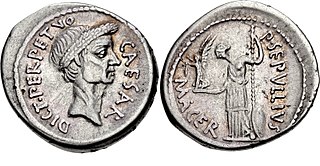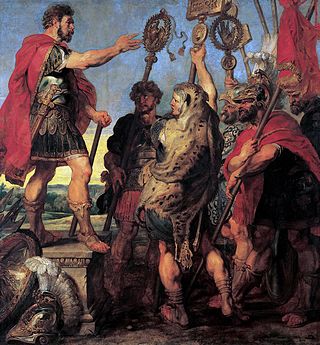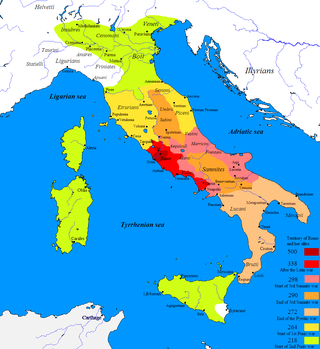Related Research Articles

Quintus Fabius Maximus Verrucosus, surnamed Cunctator, was a Roman statesman and general of the third century BC. He was consul five times and was appointed dictator in 221 and 217 BC. He was censor in 230 BC. His agnomen, Cunctator, usually translated as "the delayer", refers to the strategy that he employed against Hannibal's forces during the Second Punic War. Facing an outstanding commander with superior numbers, he pursued a then-novel strategy of targeting the enemy's supply lines, and accepting only smaller engagements on favourable ground, rather than risking his entire army on direct confrontation with Hannibal himself. As a result, he is regarded as the originator of many tactics used in guerrilla warfare.

The princeps senatus, in English the leader of the senate, was the first member by precedence on the membership rolls of the Roman Senate. Although officially out of the cursus honorum and possessing no imperium, this office conferred prestige on the senator holding it.

The gens Fabia was one of the most ancient patrician families at ancient Rome. The gens played a prominent part in history soon after the establishment of the Republic, and three brothers were invested with seven successive consulships, from 485 to 479 BC, thereby cementing the high repute of the family. Overall, the Fabii received 45 consulships during the Republic. The house derived its greatest lustre from the patriotic courage and tragic fate of the 306 Fabii in the Battle of the Cremera, 477 BC. But the Fabii were not distinguished as warriors alone; several members of the gens were also important in the history of Roman literature and the arts.
Quintus Fabius Maximus Rullianus was a patrician, politician and soldier of the Roman Republic during the fourth and early third century BC. He was the son of Marcus Fabius Ambustus, of the patrician Fabii, was five times consul, dictator once, censor, and a hero of the Samnite Wars. He was brother to Marcus Fabius Ambustus, who was named after their father, and the grandfather of Quintus Fabius Maximus Verrucosus.

A Roman dictator was an extraordinary magistrate in the Roman Republic endowed with full authority to resolve some specific problem to which he had been assigned. He received the full powers of the state, subordinating the other magistrates, consuls included, for the specific purpose of resolving that issue, and that issue only, and then dispensing with those powers immediately.

Titus Quinctius Flamininus was a Roman politician and general instrumental in the Roman conquest of Greece.
Titus Manlius Torquatus was a politician of the Roman Republic. He had a long and distinguished career, being consul in 235 BC and 224 BC, censor in 231 BC, and dictator in 208 BC. He was an ally of Fabius Maximus "Cunctator".
Quintus Fabius Q. f. M. n. Maximus Gurges, the son of Quintus Fabius Maximus Rullianus, was consul in 292, 276, and 265 BC. After a dissolute youth and a significant military defeat during his first consulate, he was given the opportunity to salvage his reputation through the influence of his father, and became a successful general, eventually holding the highest honours of the Roman state. He was slain in battle during his third and final consulate.
Marcus Junius Pera was a Roman politician before and during the Second Punic War.
Marcus Atilius Regulus was a Roman politician and statesman. He was consul in 227 and 217 BC and later censor in 214 BC. He was the son of his homonymous father who was consul in 267 and 256 BC.

Publius Decius Mus, of the plebeian gens Decia, was a Roman consul in the years 312 BC, 308 BC, 297 BC and 295 BC. He was a member of a family that was renowned for sacrificing themselves on the battlefield for Rome.
Publius Licinius Crassus Dives was consul in 205 BC with Scipio Africanus; he was also Pontifex Maximus since 213 or 212 BC, and held several other important positions. Licinius Crassus is mentioned several times in Livy's Histories. He is first mentioned in connection with his surprising election as Pontifex Maximus, and then several times since in various other capacities.
Marcus Fabius Ambustus was a statesman and general of the Roman Republic. He was the son of Numerius Fabius Ambustus.
Gaius Junius Bubulcus Brutus was a Roman general and statesman, he was elected consul of the Roman Republic thrice, he was also appointed dictator or magister equitum thrice, and censor in 307 BC. In 311, he made a vow to the goddess Salus that he went on to fulfill, becoming the first plebeian to build a temple. The temple was one of the first dedicated to an abstract deity, and Junius was one of the first generals to vow a temple and then oversee its establishment through the construction and dedication process.

Quintus Fabius Maximus was a consul of the Roman Republic in 213 BC. He was the son of Quintus Fabius Maximus Verrucosus, the famous dictator who invented Fabian strategy, and served with his father during the Second Punic War.
Lucius Veturius Philo was a Roman statesman who served as consul in 220 BC, dictator in 217 BC, and censor in 210 BC. Irregularities were found in his appointment as dictator and he resigned after fourteen days. He was a member of the gens Veturia.
Gaius Atilius Bulbus was a Roman statesman in the 3rd century BC. He served as consul twice, first in 245 with Marcus Fabius Buteo, then again in 235 alongside Titus Manlius Torquatus, who would later go on to become dictator in 208. Bulbus also served as censor in 234 alongside Aulus Postumius Albinus.

Quintus Publilius Philo was a Roman politician who lived during the 4th century BC. His birth date is not provided by extant sources, however, a reasonable estimate is about 365 BC, since he first became consul in 339 BC at a time when consuls could be elected in their twenties. His Greek cognomen ‘Philo’ was unique to his family.

Aulus Manlius Torquatus Atticus was a politician during the Roman Republic. Born into the prominent patrician family of the Manlii Torquati, he had a distinguished career, becoming censor in 247 BC, then twice consul in 244 and 241 BC, and possibly princeps senatus in 220 BC. Despite these prestigious magistracies, little is known about his life. He was a commander who served during the First Punic War, and might have pushed for the continuation of the war even after Carthage had sued for peace following the Roman victory at the Aegate Islands in 241 BC. The same year, he suppressed the revolt of the Faliscans in central Italy, for which he was awarded a triumph. At this occasion, he may have introduced the cult of Juno Curitis at Rome.
References
- ↑ B. Dexter Hoyos (1998). Unplanned Wars: The Origins of the First and Second Punic Wars. Walter de Gruyter. pp. 230–. ISBN 978-3-11-015564-8.
- ↑ Samuel Eliot (1849). The liberty of Rome: a history. G. P. Putnap; London, R. Bentley. pp. 137–.
- Livy, Ab Urbe Condita, XXIII.xxiii.